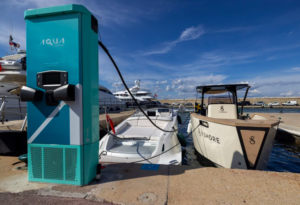
Ships to become mobile battery storage with bunkering technology

Aqua superPower says it is leading a consortium which has secured UK government funding to explore the development of a demonstrator of bi-directional boat charging. It’s being seen as “a fantastic opportunity for us to demonstrate the exciting potential that bi-directional charging could bring to the marine sector, essentially turning ships into mobile battery storage units to help save money, carbon and the planet,” according to Mike Schooling, founder and CTO at partner Indra.
The core benefit of the bi-directional charging capability is its ability to access and store greener energy for later use. Virtual bunkering enables the aggregation of electric boat batteries to provide energy storage and grid support services when not being used for propulsion. The technology has already demonstrated that it enables electric vehicle drivers to reduce energy costs and cut carbon by accessing greater levels of renewable technology at off-peak periods.
The Virtual Bunkering for Electric Vessels (VBEV) project brings together Aqua superPower and British bi-directional charging and smart energy technology company Indra, as well as independent, low-emission transport experts Cenex, and the University of Plymouth.
Matt Knight, hardware trials & data integration lead at Cenex, says his company has researched the benefits and applications of bi-directional charging in the automotive industry for the last six years. “We’re excited to see the technology applied to electric boats in coastal regions where it could have a real environmental and economic impact.”
With the transition to electrically powered vessels, there’s a requirement for charging infrastructure across marinas and harbours. Affordability of grid connections, high capital costs and battery health pose challenges to deployment. This project, says Aqua superPower, aims to develop solutions to resolve these barriers. It’ll enable existing electric boats to support the charging infrastructure without the need for expensive grid upgrades by providing a virtual electricity bunker service, delivering managed battery conditioning support and enabling additional revenue generation for boat owners.
The consortium will carry out a feasibility study to determine the financial, technical, and operational business case for the deployment of bi-directional charging infrastructure. The study will also evaluate the environmental benefit, ultimately preparing the ground for a UK demonstrator of bi-directional boat charging.
